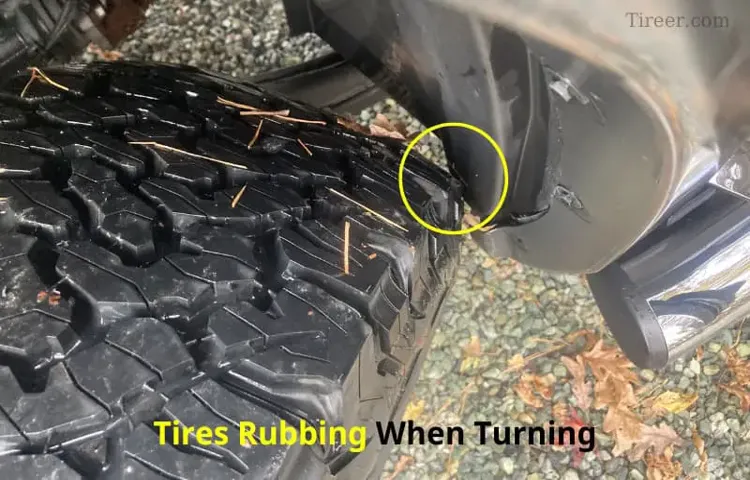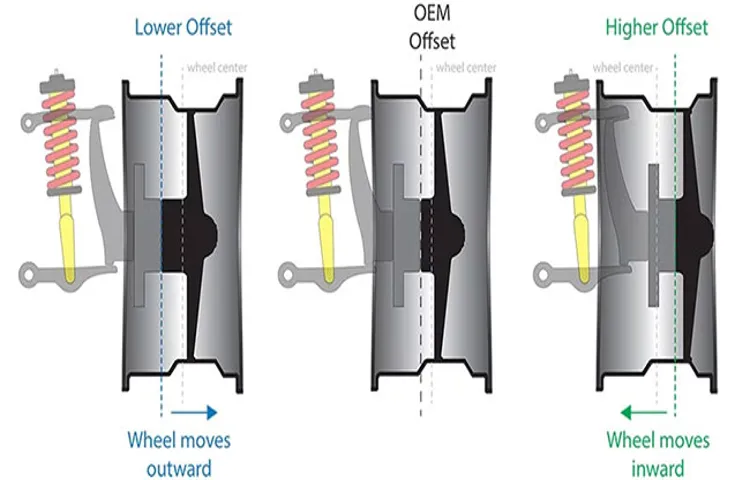Are you experiencing a skipping sensation when turning your vehicle’s tires? You’re not alone! Many drivers have encountered this issue, and it can be quite disconcerting. It’s not only frustrating, but it can also be dangerous if left unaddressed. In this blog post, we’ll explore why your tire may be skipping when turning and what you can do to fix it.
So buckle up and get ready to learn more about your car!
Table of Contents
Possible Causes
If you’re experiencing tire skipping when turning, there are a few possible causes to consider. One potential issue might be a lack of traction, which often comes from worn or improperly inflated tires. This can cause the wheels to slip or slide when turning, resulting in the skipping motion you may be noticing.
Another possibility is an issue with your suspension system, which could cause uneven weight distribution and result in tire skips. Additionally, excessive speed when turning can also cause skipping, as can aggressive driving maneuvers. It’s important to diagnose the root cause of the skipping to ensure your safety and prevent further damage to your vehicle.
Consider getting an inspection from a trusted mechanic to determine the underlying issue and address it promptly.
Worn Out Tires
Worn Out Tires: Possible Causes Worn-out tires can be a real pain in the neck for any driver. They can lead to a decrease in the car’s performance, a higher risk of accidents, and an overall unpleasant driving experience. There are many possible causes of worn-out tires, and drivers should make sure to stay vigilant and take necessary precautions to prevent damage.
One of the main reasons for worn-out tires is improper inflation. If your tires are underinflated, they can get more worn out at the edges, while overinflated tires tend to get worn out more in the center. Another potential reason for worn-out tires is misalignment, which occurs when the wheels are not properly lined up.
Misaligned tires can lead to uneven wear and tear, which can cause them to wear out faster. Moreover, driving on damaged roads, harsh terrain, and rough or uneven surfaces can cause your tires to wear out faster. Maintaining proper tire care, such as regular tire rotations, maintaining the wheel balance, and checking for punctures or cuts, can help your tires last longer and reduce the likelihood of worn-out tires.
Taking care of your car’s tires can help keep you and your passengers safe on the road while ensuring better driving comfort and longevity.

Alignment Problems
Alignment problems in machines can be caused by a variety of factors. One possible cause is improper installation or assembly, which can result in mechanical components that are not aligned correctly. Another possibility is wear and tear over time, especially in moving parts that are subjected to repeated stress and strain.
Additionally, improper maintenance can exacerbate alignment issues by allowing small problems to escalate into larger ones. Other factors to consider include environmental conditions, such as temperature and humidity fluctuations, which can affect machine parts and cause alignment issues. By identifying the root cause of any alignment problems and taking proactive steps to address them, you can help ensure that your machines continue to operate smoothly and reliably over the long term.
Suspension Issues
Suspending issues in a vehicle can be caused by a variety of factors. One of the most common reasons is worn-out shock absorbers or struts. These components are responsible for controlling the motion of the vehicle’s suspension and absorbing impacts from the road.
Over time, they can become weakened or damaged, which can result in a bumpy and unstable ride. Another potential cause of suspension issues is a problem with the suspension springs. These can also become worn-out or broken, resulting in the car’s suspension sagging or leaning to one side.
Other common culprits include issues with the suspension bushings or bearings, which can cause excessive vibration and noise in the vehicle. Regardless of the potential cause, it is imperative to get suspension issues addressed as soon as possible to ensure a safe and comfortable driving experience on the road.
Braking System Malfunction
If you experience a malfunction in your vehicle’s braking system, there could be several possible causes. One of the most common culprits is worn brake pads, which can lead to reduced braking power and longer stopping distances. Another possibility is a leak in the brake lines, which can cause a loss of hydraulic pressure and lead to reduced braking power or a complete brake failure.
Faulty brake calipers or a malfunctioning master cylinder are also potential causes of braking system problems. It is essential to have your brakes inspected regularly and repaired promptly if any issues arise, as a malfunctioning braking system can put you and your passengers in danger on the road. Remember to always keep an eye on your vehicle’s braking performance and address any concerns immediately to ensure your safety on the road.
Effects of Skipping Tires
Skipping tires when turning can have a number of negative effects on your vehicle. For one, it can greatly reduce the amount of control you have over your car. When tires skip, they lose traction, which means your ability to steer and react to sudden changes in the road becomes compromised.
This can be especially dangerous in wet conditions or on uneven terrain. Additionally, skipping tires can cause damage to your axles, suspension, and other parts of your car over time. If you notice your tires skipping when turning, it’s important to have them checked out by a mechanic as soon as possible to prevent further damage and ensure your safety while driving.
Reduced Handling and Braking Performance
When it comes to maintaining your car, one of the most essential aspects is tire care. Skipping tires can have a significant impact on your vehicle’s handling and braking performance, which can be particularly dangerous. Tires that are worn out or have incorrect pressure will not grip the road as efficiently, making your car less responsive when you steer or brake.
Skipping tires can also cause your car to skid or slide, especially in wet or icy conditions. When this happens, you lose control of your vehicle, putting yourself and others at risk of an accident. Therefore, it is essential to check your tires regularly, including their pressure and condition.
Proper maintenance can help you avoid the negative effects of skipping tires and keep your car safe and reliable on the road.
Increased Risk of Accidents
Skipping tires is a practice that some drivers tend to do when they’re in a hurry or simply lazy. However, it can have serious consequences on the road. Skipping tires can lead to an increased risk of accidents, as worn-out tires cannot grip the road properly, especially in wet conditions.
This can cause the driver to lose control of the vehicle, resulting in a potentially fatal crash. In addition, skipping tires can also cause blowouts, which can be extremely dangerous, especially at high speeds. Therefore, it is essential to ensure that your tires are in good condition and properly maintained, especially if you frequently drive on long trips or in areas with inclement weather.
By regularly checking and replacing your tires, you can avoid the risks of skipping tires and keep yourself and your passengers safe on the road. Remember, the safety of your vehicle starts with the condition of your tires!
How to Fix Skipping Tires
If you’re experiencing tire skipping when turning, there could be a few causes at play. First, it’s important to check your tire pressure and ensure that it’s at the recommended level. Excessive wear on your tires or an alignment issue could also be contributing factors, so it’s a good idea to inspect your tires and get a professional opinion if necessary.
Another common cause of tire skipping is driving too fast around turns, so it’s important to slow down and be cautious when navigating corners. Overall, taking the time to regularly inspect and maintain your tires can help prevent skipping and keep you safe on the road.
Replace Worn-Out Tires
Replacing worn-out tires is crucial for the safety of your vehicle and yourself. One issue you may encounter with old tires is skipping, which can cause the vehicle to feel unstable and difficult to control. There are a few reasons why your tires might be skipping, but the most common is that they are worn down and no longer have enough tread to grip the road properly.
If this is the case, the only solution is to replace the tires with new ones that have plenty of tread. Not only will this improve your car’s handling, but it will also reduce the risk of a blowout or other dangerous tire failure. So, if you notice your vehicle skipping or feel like your tires might be worn out, don’t wait to get them replaced.
Your safety is too important to risk.
Correct Your Vehicle’s Alignment
If you’re experiencing skipping tires while driving, one potential cause could be a misaligned vehicle. When your car’s wheels aren’t properly aligned, it causes uneven wear on the tires, leading to issues like skipping and even worse, loss of control. The good news is that fixing your vehicle’s alignment is a straightforward process that can be done by a trained mechanic.
They’ll use specialized equipment to make sure your wheels are lined up correctly, which will help you avoid issues like skipping tires down the road. Don’t wait until it’s too late to get your alignment checked – it’s a simple fix that could save you from serious safety concerns while driving.
Address Suspension Issues
If you’ve ever experienced a bouncing and skipping sensation while driving, it’s likely due to suspension issues. This problem can be caused by several factors such as worn-out shocks and struts, damaged or broken springs, or misaligned wheels. To fix your skipping tires, the first step is to inspect your suspension system for any visible signs of damage or wear.
Next, you should check your tire pressure and alignment, ensuring they are within manufacturer’s specifications. Additionally, replacing worn-out shocks and struts or broken springs can significantly improve your vehicle’s stability on the road, preventing it from bouncing and skipping as you drive. Regular maintenance of your vehicle’s suspension system can save you from costly repairs down the road, so ensure you take care of it to avoid any potential safety hazards.
Repair Your Braking System
Braking System If you’ve noticed your tires skipping, it’s a sign that your braking system may need some attention. Skipping tires can be a cause for concern as it’s not only dangerous but can also lead to costly damages down the line. Fortunately, fixing this issue is relatively simple and can be done by either replacing or resurfacing your brake rotors.
When brake rotors become warped or damaged, they can cause your tires to skip, and it’s essential to address the problem before it spirals out of control. Additionally, ensuring that your brake pads are in good condition can also help prevent skipping tires. Neglecting your braking system can lead to more significant issues, so it’s always best to be proactive and address any concerns as soon as they arise.
Remember, your car’s braking system is crucial in keeping you and others on the road safe.
Conclusion
So when it comes to tires skipping when turning, it’s clear that they’re just trying to breakdance their way out of a sticky situation. But unfortunately for them, we need to make sure our vehicles are safe and sound on the road. So next time you feel your tires getting a little too fancy during a turn, remember to slow down and give them the grip they need to stay on the beat.
Keep on rollin’!”
FAQs
Why is my tire skipping when turning?
There could be several reasons for tire skipping when turning. It could be due to worn-out tires, low tire pressure, misaligned wheels, faulty suspension, or worn-out steering components. Have a professional diagnose the problem to determine the exact cause and necessary repairs.
Can low tire pressure cause tire skipping when turning?
Yes, low tire pressure can cause tire skipping when turning, as it affects the tire’s grip on the road. Make sure to check your tire pressure regularly and keep it at the recommended level.
How do worn-out tires cause tire skipping when turning?
Worn-out tires have less tread, which reduces their grip on the road. This can cause the tire to lose traction and skip when turning. Replace your tires when the tread depth reaches 2/32 of an inch to ensure proper traction and avoid accidents.
What can cause misaligned wheels to make the tire skip when turning?
Misaligned wheels can cause uneven tire wear, which can affect the tire’s grip on the road. This can cause the tire to skip when turning. Have your wheels properly aligned to prevent uneven wear and improve driving performance.
Can faulty suspension cause tire skipping when turning?
Yes, faulty suspension can cause tire skipping when turning, as it affects the vehicle’s stability and handling. Have a professional inspect your suspension system and replace any worn-out parts to improve your vehicle’s performance.
How do worn-out steering components affect tire skipping when turning?
Worn-out steering components can cause the vehicle’s steering to become loose or unstable, affecting tire grip when turning. Have your steering components checked and replace any worn-out parts to ensure proper steering and handling.
What type of tires are best for preventing tire skipping when turning?
Tires with good traction and grip, such as all-season or winter tires, are best for preventing tire skipping when turning. Make sure to choose a tire with a tread pattern that is appropriate for your vehicle and driving conditions.



